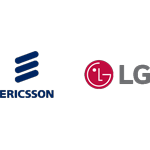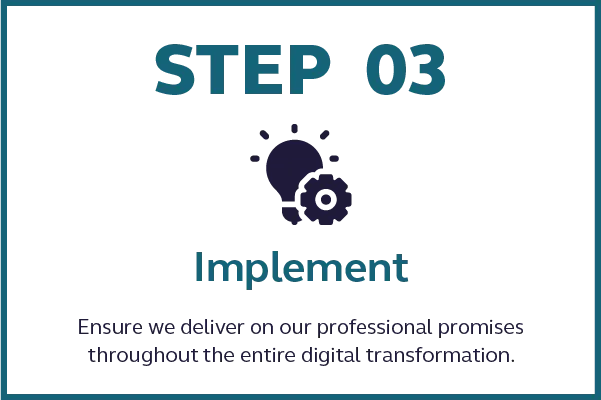
Digital transformation consulting & solutions
A digital transformation will revolutionise the way you work; keep your operations at the cutting edge of technological innovation; enable an agile workforce; increase efficiency and enhance customer delivery.
What is digital transformation?
Digital transformation is the process of integrating digital technologies into all areas of business, to create new – or update existing – business processes, operations, communications and customer experiences. It enables you to embrace intelligent, tech-facilitated systems across your business operations – allowing you to become more efficient and more productive.
Digital transformation can mean anything from IT modernisation, such as a shift to cloud computing, or a move from paper based records to spreadsheets, to the implementation of a hosted phone system or harnessing the power of new technology to interact with customers in more efficient ways e.g. via live chat. The customer of today expects to be able to reach you at the touch of a button, anytime and anywhere, so it’s vital to ensure your business is always on and ultra-responsive.

How can Datasharp & Focus Group transform your business
























What are the benefits of digital transformation?
Reduced Costs
The primary objective of business digital transformation is to invest in scalable applications that accommodate future growth and a modern workplace. Digital transformation benefits your business by reducing the expenditure on the operation and maintenance of a traditional IT hardware. In turn, freeing up budget that can be reinvested into customer-facing resources to increase sales, productivity and profitability.
Productivity
Improved productivity is key to business expansion and improving your ROI. The development of a digital transformation strategy and adoption of digital technology such as cloud-based data storage or hosted phone systems, ensures processes can be streamlined or enhanced to reduce manual effort and increase productivity levels, ensuring a return on your investment, and futureproofing your technology.
Connectivity
A clear digital transformation strategy facilitates change and evolves business operations. It empowers employees to work collaboratively and efficiently, across multiple platforms…with ease. Digital technology will also enable your business to adapt and grow, as your business does, ensuring employees and customers are quickly and cost-effectively able to stay connected at all times, from any location.
Enhanced Service
Harness the power of technology to evolve the way you operate and deliver service to your customers. It enables you to embrace intelligent, tech-facilitated systems across your business operations, to optimise the customer experience and stay ahead of the competition.
Accessibility
Digital transformation will empower your team to communicate, innovate and collaborate by arming them with the tools and technology to easily access data, applications, desktops, files and communication platforms from anyway, at any time and from any device.
Flexibility
Put your business in a supremely agile position, with the ability to scale up alongside business growth or support operations across multiple locations. It delivers the flexibility to access your business data and communication platforms – fluently and efficiently.
Digital transformation strategy
Embracing your digital transformation involves a strategic blend of cultural and mindset shifts. At Focus Group, we’ve devised a step-by-step process to ensure your digital transformation is swift and seamless:
Scope


Create
Our team will design a comprehensive solution in relation to the agreed scope. Through frequent collaboration with experts across the Focus Group team, we will provide impactful and innovative design processes for your digital transformation strategy. Here, you can also review, question and experience the recommended technologies we’ve put in place work their magic.
Implement
Our team will perform rigorous testing and provide training so that the digital transformation process is smooth and seamless for everyone interacting with the project. Furthermore, we will ensure the project and its success can be tracked throughout its entire process, recording any milestones achieved as the digital transformation occurs.


Maintain
Support

Digital transformation solutions
Free consultation service
Through a range of collaborative tools and scalable technologies, undergoing digital transformation will facilitate hybrid working, unrivalled connectivity, and unified communications, Focus Group specialises in providing cutting-edge technologies, cloud solutions, and software applications that enhance efficiency and drive innovation, for businesses of all sizes, at affordable prices. Our experts will analyse your existing technologies an build a journey for your business, creating a digital transformation strategy that will not only revolutionise your business, but futureproof your business to ensure your technology grows with your business.
Book your free consultation with our team of experts today, and find a digital transformation solution that answers all your business needs.


Collaboration tools
Digital transformation plays a pivotal role in facilitating collaboration by providing businesses with the necessary tools and platforms to connect and engage with stakeholders seamlessly. Through the adoption of digital technologies, such as cloud computing, collaborative software, and communication tools, teams can collaborate in real-time, regardless of their physical location. This enables efficient sharing of information, ideas, and resources, fostering a culture of collaboration and innovation. Additionally, digital transformation empowers staff to break down communications barriers and promote cross-functional collaboration, enabling different departments to work together towards common goals. By streamlining processes and enhancing communication channels, digital transformation enhances productivity, accelerates decision-making, and ultimately drives business success through effective collaboration.
Unified Communications
Unified Communications is all about interlinking your technology and your data, and connecting your people, communication systems, applications, cloud platforms and networks – seamlessly, across your entire business. From enterprise level to SME businesses, embracing Unified Communication solutions opens up new possibilities and whether it’s empowering your team with an effective digital workplace, or transforming the operations and management of your network infrastructure – we’ve got you covered when it comes to Unified Communications.


Hybrid Working
Frequently asked questions
Why do businesses need digital transformation?
Digital technology prepares your business for a smarter future by creating IT modernisation, such as a shift to communication platforms for efficient service delivery, harnessing the power (and security) of cloud-based tech and by developing the tools needed to support an efficient, agile workforce.
What is needed for digital transformation?
Digital transformation means starting with a strategy and creating a roadmap for the future. It means upgrading your business technology to facilitate growth and embracing a digital infrastructure that leverages automation and improves data security.
What is an example of digital transformation?
Digital transformation can include anything from IT modernisation, such as a shift to cloud computing, to the implementation of a hosted phone system or a transformational connectivity solution, to the installation of new technology to enable your team to interact with customers in new ways.
What is digital transformation strategy?
A digital transformation strategy is the planned and strategically deployed integration of technology into all areas of your business. It enables you to embrace intelligent, tech-facilitated systems across your business areas and fundamentally evolve the way you operate, communicate and deliver service to your customers.
What is the impact of digital transformation?
Digital transformation prepares your business for the future with innovative technology facilitating smarter ways of working, streamlined communications, an efficient workforce, secure date and an enhanced customer experience.
What are the 4 main areas of digital transformation?
There are four main components of digital transformation.
- It starts with strategy – aligning the digital transformation effort with the overall strategy. Customer experience is key – focusing on developing a digital future that delivers unified communications and enhanced service.
- Customer experience is key – focusing on developing a digital future that delivers unified communications and enhanced service.
- Adopting a new way of working – Culture underpins the digital transformation to ensure the workforce is empowered by new technology and embraces new ways of working.
- Data remains at the heart of digital transformation – using data to make informed decisions, enhance processes and support growth objectives. All stored securely in the cloud of course.Digital transformation prepares your business for the future with innovative technology facilitating smarter ways of working, streamlined communications, an efficient workforce, secure date and an enhanced customer experience.
What are the steps of digital transformation?
A digital transformation strategy is, in essence, a roadmap for short, medium and long-term digital transformation goals. It should be a step-by-step process:
- This begins with aligning on the core objectives for digital transformation – answering the key questions of how, why, when and what digital transformation means for your business.
- Focus next upon culture – your people should be at the heart of your digital transformation, ready to embrace new technologies and the accompanying benefits.
- The next step is to determine a realistic timeline, to ensure the long-term success of your digital transformation. Map out the technology your business needs for a complete digital transformation – some may already be in place, others will need to be migrated or integrated into your overarching strategy.
- Review options for technology partners and harness the power of their expertise to refine your digital transformation roadmap.
- Implement and transform!
What is required for digital transformation?
Three key areas of business need to be united for digital transformation – customer experience, operational processes and business models.